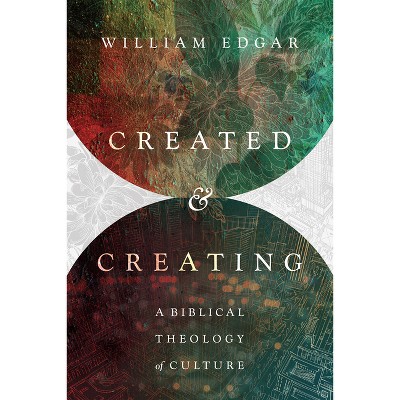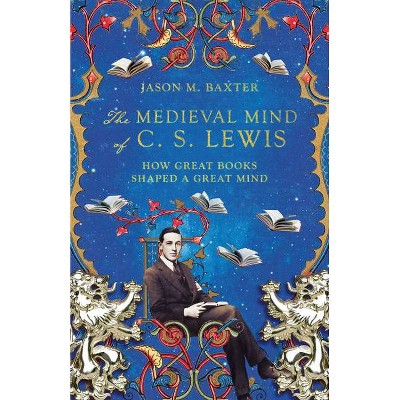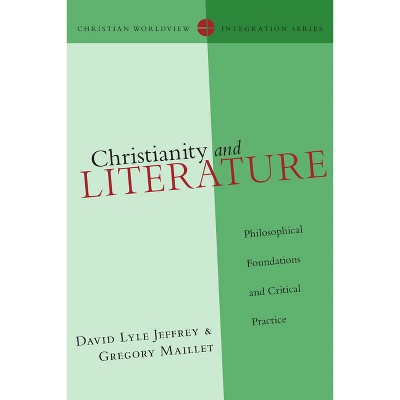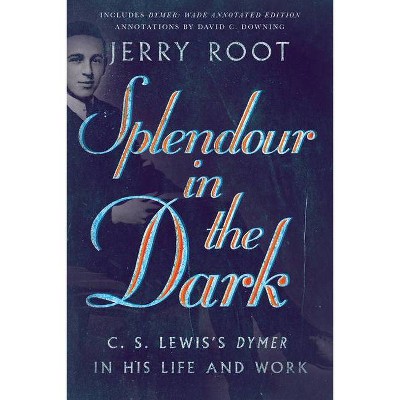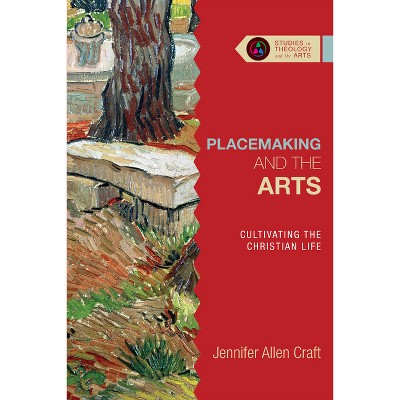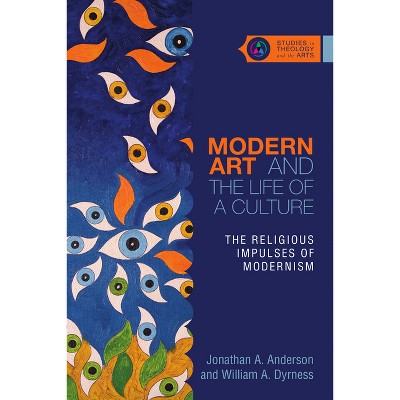About this item
Highlights
- Theologian and jazz pianist William Edgar places jazz within the context of the African American experience and explores the work of musicians like Miles Davis and Ella Fitzgerald, arguing that jazz, which moves from deep lament to inextinguishable joy, deeply resonates with the hope that is ultimately found in the good news of Jesus Christ.
- About the Author: William Edgar (DThéol, Université de Genève) is professor of apologetics and coordinator of the apologetics department at Westminster Theological Seminary in Philadelphia as well as professeur associé at the Faculté Jean Calvin in Aix-en-Provence, France.
- 224 Pages
- Religion + Beliefs, Christianity
Description
About the Book
Theologian and jazz pianist William Edgar places jazz within the context of the African American experience and explores the work of musicians like Miles Davis and Ella Fitzgerald, arguing that jazz, which moves from deep lament to inextinguishable joy, deeply resonates with the hope that is ultimately found in the good news of Jesus Christ.
Book Synopsis
Theologian and jazz pianist William Edgar places jazz within the context of the African American experience and explores the work of musicians like Miles Davis and Ella Fitzgerald, arguing that jazz, which moves from deep lament to inextinguishable joy, deeply resonates with the hope that is ultimately found in the good news of Jesus Christ.
Review Quotes
"Art is surprisingly adept at finding beauty in the paradoxes and tensions of Christian faith, and jazz music is a particularly potent genre in this regard. William Edgar's A Supreme Love is a lovely reflection on the ways jazz and the gospel can converse. Edgar offers a welcome example of sophisticated theological engagement with music, without feeling forced. I learned so much reading this book-and discovered some great music too!"
"For many years, Bill Edgar has been a leading figure in the music and theology world. Here he shows how deeply intertwined jazz is with the Christian gospel. But not only does he have an impressive grasp of his subject, he is a practitioner par excellence. This double qualification means that anything he writes deserves to be listened to with special care."
"In my musician mind there has always been a deep connection between jazz, musical improvisation, and the disciple life. To risk the creation of improvised music armed with only imagination and talent is to dive right in to the center of grace. It's in the grace of God through Jesus that the musician finds peace, receives love that casts out fear, and learns to trust the reconciling power of the gospel to turn every misspent note into a glorious tool of orchestration. I simply don't know of any contemporary who has mined this field more than Bill Edgar. With A Supreme Love, the gifted Dr. Edgar invites all readers from every vocation to experience what he's known and taught for decades now: Jesus and jazz are inextricably linked."
"It is evident on every page that this is a labor of great love, informed by a lifetime of listening to and performing jazz music. Bill Edgar gives particular attention to the ways that jazz reflects the profound suffering and the extraordinary strength of the African American community. It is just this history, he argues, that gives rise to a music that enacts a gospel-shaped movement from sorrow to joy."
"Jazz pianist Professor Edgar shows convincingly how jazz is rooted in the African American Black experience of daily persecuted suffering and Sunday jubilation. The biblical faith of spirituals and the psalm-like lament of blues constitute the very fiber of jazz. That is why jazz music can move from expressing deep misery to ending with sounds of inextinguishable joy. This well-written book has verve, is effortlessly informed, and offers a treasury of websites and books for anyone who wishes to understand and enjoy the gift of jazz."
"Once in a while a theologian tips the hand and reveals their passions unrelated to their professional pursuits. Karl Barth wrote on Mozart, and William Edgar, respected theologian at Westminster Theological Seminary, has written A Supreme Love, paying homage to his passion for jazz. A competent practitioner of the art form throughout his life, he puns on Coltrane's A Love Supreme for the title of his book. The result: a mature theologian's thinking that generates a sophisticated and personal account of the historical sweep of jazz history through the lens of a performer who has had a rich life of interacting with luminaries in jazz history. A delightful read for many who would be both theology-inclined readers and lovers of the arts who might not necessarily bring jazz into the conversation. For those who enjoy both passions, this book's for you. May this book always appeal to the intellectually curious, not least to those interested in theology and jazz history."
"William Edgar's A Supreme Love stands as something of a tour through the story of jazz and all that has shaped and informed it. After a solid introductory chapter called 'Jazz and the Gospel, ' Edgar takes the reader through a tour of slavery, the churches, the spirituals, the blues, gospel, and all the social, religious, and musical forces that coalesced in the development of jazz-a tour that runs for nearly half his book. But that's Edgar's way, as he doesn't want to rush too quickly past all those formative voices and influences, such that when he arrives at the point where jazz music begins to be formed, the reader is ready to roll. Newcomers to this music will find a deep and useful introduction to the music, with footnotes filled with links to online samples. Jazz fans will enjoy the tour, quibbling from time to time as to why this artist or that album wasn't cited . . . which is something jazz fans love to do! Read and be enriched."
"With love and verve, Bill Edgar describes jazz-the movement from deep misery to unspeakable joy-not only as the gift of the creativity and hard-won faith of Black artists, but also as a reflection of the racial and musical complexity of America. Read the book and listen to the music (on the links Edgar provides) with gratitude to these Black artists and the loving God who inspired them."
"In my musician mind there has always been a deep connection between jazz, musical improvisation, and the disciple life. To risk the creation of improvised music armed with only imagination and talent is to dive right in to the center of grace. It's in the grace of God through Jesus that the musician finds peace, receives love that casts out fear, and learns to trust the reconciling power of the gospel to turn every misspent note into a glorious tool of orchestration. I simply don't know of any contemporary who has mined this field more than Bill Edgar. With A Supreme Love, the gifted Dr. Edgar invites all readers from every vocation to experience what he's known and taught for decades now: Jesus and jazz are inextricably linked."
--Charlie Peacock, Grammy Award-winning music producer and founder of the commercial music program at Lipscomb University"Once in a while a theologian tips the hand and reveals their passions unrelated to their professional pursuits. Karl Barth wrote on Mozart, and William Edgar, respected theologian at Westminster Theological Seminary, has written A Supreme Love, paying homage to his passion for jazz. A competent practitioner of the art form throughout his life, he puns on Coltrane's A Love Supreme for the title of his book. The result: a mature theologian's thinking that generates a sophisticated and personal account of the historical sweep of jazz history through the lens of a performer who has had a rich life of interacting with luminaries in jazz history. A delightful read for many who would be both theology-inclined readers and lovers of the arts who might not necessarily bring jazz into the conversation. For those who enjoy both passions, this book's for you. May this book always appeal to the intellectually curious, not least to those interested in theology and jazz history."
--Johann Buis, musicologist, Wheaton College"William Edgar's A Supreme Love stands as something of a tour through the story of jazz and all that has shaped and informed it. After a solid introductory chapter called 'Jazz and the Gospel, ' Edgar takes the reader through a tour of slavery, the churches, the spirituals, the blues, gospel, and all the social, religious, and musical forces that coalesced in the development of jazz--a tour that runs for nearly half his book. But that's Edgar's way, as he doesn't want to rush too quickly past all those formative voices and influences, such that when he arrives at the point where jazz music begins to be formed, the reader is ready to roll. Newcomers to this music will find a deep and useful introduction to the music, with footnotes filled with links to online samples. Jazz fans will enjoy the tour, quibbling from time to time as to why this artist or that album wasn't cited . . . which is something jazz fans love to do! Read and be enriched."
--Jamie Howison, author of God's Mind in That Music: Theological Explorations Through the Music of John ColtraneAbout the Author
William Edgar (DThéol, Université de Genève) is professor of apologetics and coordinator of the apologetics department at Westminster Theological Seminary in Philadelphia as well as professeur associé at the Faculté Jean Calvin in Aix-en-Provence, France. He is the author of several books, including Created and Creating: A Biblical Theology of Culture; Reasons of the Heart: Recovering Christian Persuasion; Does Christianity Really Work?; The Christian Mind: Escaping Futility; A Transforming Vision: The Lord's Prayer as a Lens for Life; Francis Schaeffer on the Christian Life; and Christian Apologetics Past and Present.







